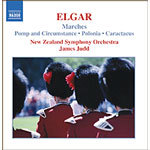
Elgar: Marches (Including Pomp and Circumstances)
 $25.00
Out of Stock
$25.00
Out of Stock6+ weeks add to cart
EDWARD ELGAR
Elgar: Marches (Including Pomp and Circumstances)
New Zealand Symphony Orchestra / James Judd (conductor)
[ Naxos / CD ]
Release Date: Friday 29 April 2005
This item is currently out of stock. It may take 6 or more weeks to obtain from when you place your order as this is a specialist product.
"Nowadays, no one should be surprised to see Elgar being recorded in New Zealand, albeit with a British-born conductor. These performances are certainly idiomatic and I doubt that I would be able to discriminate "blind" this orchestra from, say, the Hallé. Judd's approach is to give the music more circumstance than pomp with tempi generally rather broad. This serves the music well and the only controversial moment comes at the climax of the first Pomp and Circumstance march where Judd's lengthy comma before the last reprise of the big tune (i.e. Land of Hope and Glory) may jar on repeated listening (whereas anything goes at this stage of the last night of the Proms). The orchestral playing is excellent and the recording has both depth and refinement. There are useful notes by Keith Anderson. In summary, a disc of music which is performed, recorded and presented well. This is a desirable bargain-price collection which should certainly find a niche in the market." - MusicWeb April 2005
Sir Edward Elgar occupies a strange position in his own country. For many he is associated with British, or, more specifically, English Imperialism, epitomized in Land of Hope and Glory, a patriotic anthem now sung with gusto and tongue in cheek on the last night of the London Promenade Concerts each year. The image of an Edwardian country gentleman, with his dogs and horses is misleading. Elgar was the son of a shopkeeper, in the days when to be in trade marked a man for life and escape from this background earned a man the name of counter-jumper. He married the daughter of a retired Indian Army general, a pupil of his, nine years his senior, and it was she who gave him the necessary support, morally and socially, that finally helped him to make his way in Edwardian society. Nevertheless, musically Elgar was far nearer to the German romantic composers of his time than to the developing vein of English music, with its pastoral reliance on newly collected folk-song.
Edward Elgar was born near Worcester, in the West of England, in 1857. His father was a piano-tuner, organist, violinist and eventually a shopkeeper, and it was from him that Elgar acquired much of his musical training. He at first made his living as a free-lance musician, teaching, playing the violin and organ, and conducting local amateur orchestras and choirs. His first success away from his own West Country, after earlier abortive attempts, was in 1897 with his Imperial March, written for the royal jubilee celebrating sixty glorious years of Queen Victoria. His reputation was further enhanced by the so-called Enigma Variations of 1899. The oratorio The Dream of Gerontius, which followed in 1900, was less successful at its first performance in Birmingham, but later became a staple element in British choral repertoire. His publishers Novello had not always been particularly generous in their treatment of him, but he came to rely on the encouragement of the German-born Augustus Johannes Jaeger, a reader for the firm, who found in Elgar's music something much more akin to the music of his native country.
Public recognition brought Elgar many honours, his position sealed by the composition of music for the coronation of King Edward VII. He was awarded honorary doctorates by universities old and new and in 1904 received the accolade of a knighthood. Later official honours included the Order of Merit in the coronation honours of 1911 and finally, in 1931, a baronetcy. Acceptance, as represented by the musical establishment of the country, was confirmed by the award of the Gold Medal of the Royal Philharmonic Society in 1925, after an earlier award to Delius.
Elgar's work had undergone significant changes in the later years of the 1914-18 war, a development evident in his Cello Concerto of 1919. His wife's death in 1920 removed a support on which he had long relied, and the last fourteen years of his life brought a diminishing inspiration and energy in his work as a composer, although he continued to meet demands for his appearance as a conductor in both the concert-hall and recording studio. He died in 1934.
The marches that Elgar wrote, whether for public occasions or as an incidental part of other works, represent only one aspect of his achievement as a composer, and not necessarily the most important, in spite of the wide popularity a number of them have enjoyed. Altogether they often represent music of profounder achievement, by no means jingoistic in conception, whatever the present connotations may be.
Tracks:
Coronation March, Op. 65
Grania and Diarmid, Op. 42, No. 2: Funeral March
Military Marches, Op. 39, Nos. 1-5, "Pomp and Circumstance"
March No. 1 in D major 06:13
March No. 2 in A minor 05:08
March No. 3 in C minor 05:48
March No. 4 in G major 05:14
March No. 5 in C major 06:16
Caractacus, Op. 35: Triumphal March
The Crown of India, Op. 66, No. 4:
March of the Mogul Emperors
Empire March
Polonia, Op. 76



